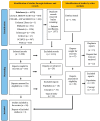Educational technologies for families and children with type 1 diabetes: a scoping review
- PMID: 39899746
- PMCID: PMC11774519
- DOI: 10.1590/1980-220X-REEUSP-2024-0134en
Educational technologies for families and children with type 1 diabetes: a scoping review
Abstract
Objective: To map scientific evidence on educational technologies developed for family members and children with type 1 diabetes.
Method: Scoping review, according to JBI recommendations, and described in accordance with the checklist PRISMA-ScR. Searches were carried out in the LILACS, BDENF, PUBMED, COCHRANE, CINAHL, EBSCO, Scopus and Embase/Elsevier, Web of Science/Clarivate Analytics, Scielo, VHL Regional Portal and gray literature databases.
Results: Fifty-three studies published between 1980 and 2023 were included. The evidence was categorized into digital educational technologies, which provide innovative resources to educate and support children and families, and non-digital educational technologies, which provide practical and interactive opportunities for learning about diabetes.
Conclusion: The results highlight the relevance of educational technologies in the care of children with type 1 diabetes. However, they reveal a gap in the assessment of the effectiveness of these interventions in the long term, with regard to adherence to treatment and improvement in quality of life. Research is required to evaluate the effectiveness of these technologies and the impact of educational interventions.
Objetivo:: Mapear evidencia científica sobre tecnologías educativas desarrolladas para familias y niños con diabetes tipo 1.
Método:: Revisión del alcance, según recomendaciones del JBI, y descrita de acuerdo con el lista de verificación PRISMA-ScR. Las búsquedas se realizaron en las bases de datos LILACS, BDENF, PUBMED, COCHRANE, CINAHL, EBSCO, Scopus y Embase/Elsevier, Web of Science/Clarivate Analytics, Scielo, Portal Regional de la BVS y literatura gris.
Resultados:: Se incluyeron 53 estudios publicados entre 1980 y 2023. La evidencia se clasificó en tecnologías educativas digitales, que ofrecen recursos innovadores para educar y apoyar a los niños y las familias, y tecnologías educativas no digitales, que brindan oportunidades prácticas e interactivas para aprender sobre la diabetes.
Conclusión:: Los resultados resaltan la relevancia de las tecnologías educativas en el cuidado de niños con diabetes tipo 1. Sin embargo, revelan una brecha en la evaluación de la efectividad a largo plazo de estas intervenciones, en lo que respecta a la adherencia al tratamiento y la mejora de la calidad de vida. Se necesita investigación para evaluar la efectividad de estas tecnologías y el impacto de las intervenciones educativas.
Figures
Similar articles
-
Beyond the black stump: rapid reviews of health research issues affecting regional, rural and remote Australia.Med J Aust. 2020 Dec;213 Suppl 11:S3-S32.e1. doi: 10.5694/mja2.50881. Med J Aust. 2020. PMID: 33314144
-
Educational technologies for accident prevention due to falls in childhood: a scoping review.Rev Bras Enferm. 2023 Dec 8;76Suppl 4(Suppl 4):e20220807. doi: 10.1590/0034-7167-2022-0807. eCollection 2023. Rev Bras Enferm. 2023. PMID: 38088710 Free PMC article.
-
Telenursing in the postoperative period: a scoping review.Rev Bras Enferm. 2024 Jul 29;77(3):e20240066. doi: 10.1590/0034-7167-2024-0066. eCollection 2024. Rev Bras Enferm. 2024. PMID: 39082556 Free PMC article.
-
Psychological interventions to improve self-management of type 1 and type 2 diabetes: a systematic review.Health Technol Assess. 2020 Jun;24(28):1-232. doi: 10.3310/hta24280. Health Technol Assess. 2020. PMID: 32568666 Free PMC article.
-
Folic acid supplementation and malaria susceptibility and severity among people taking antifolate antimalarial drugs in endemic areas.Cochrane Database Syst Rev. 2022 Feb 1;2(2022):CD014217. doi: 10.1002/14651858.CD014217. Cochrane Database Syst Rev. 2022. PMID: 36321557 Free PMC article.
References
-
- International Diabetes Federation. IDF Guide for diabetes epidemiological studies [Internet]. Brussels: IDF; 2021. [[cited 2023 Aug 8].]. Available from: https://diabetesatlas.org/atlas/tenth-edition/
-
- Gomes GC, Moreira MAJ, Silva CD, Mota MS, Nobre CMG, Rodrigues EF. Vivências do familiar frente ao diagnóstico de diabetes mellitus na criança/adolescente. J Nutr Health. 2019;9(10):e19910. doi: 10.15210/jonah.v9i1.13393. - DOI
-
- Teixeira LB, Santos ABAS, Coêlho LPI, Guedes TSA, Marques VGPS, Soares MS, et al. O cuidador familiar frente a criança com diabetes mellius tipo 1: ações educativas. RECIMA21. 2021;2(9):e29735. doi: 10.47820/recima21.v2i9.735. - DOI
-
- Rodrigues SC, Schelder GL. Tecnologia educacional para pessoas em uso de insulina. Ciênc Cuid Saúde. 2020;19:1–12. doi: 10.4025/ciencuidsaude.v19i0.50376. - DOI
Publication types
MeSH terms
LinkOut - more resources
Full Text Sources
Medical
Miscellaneous



